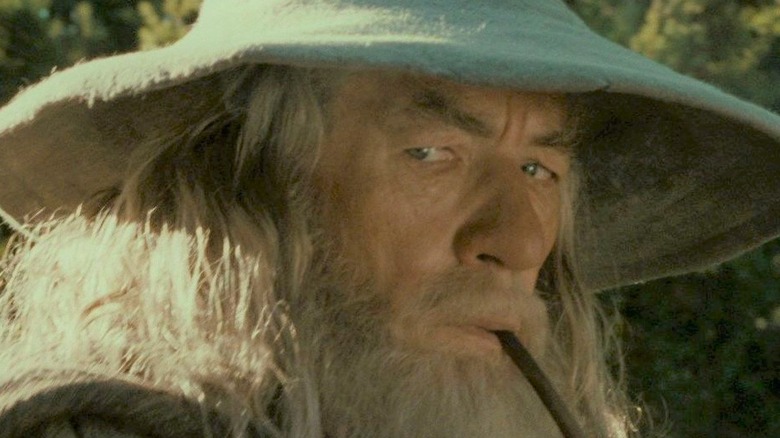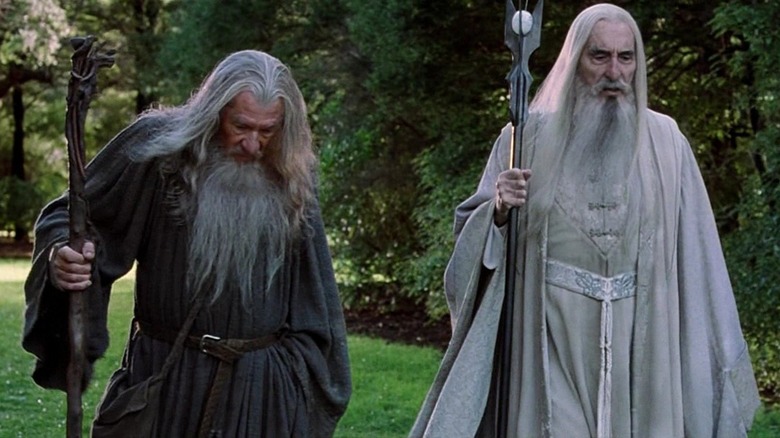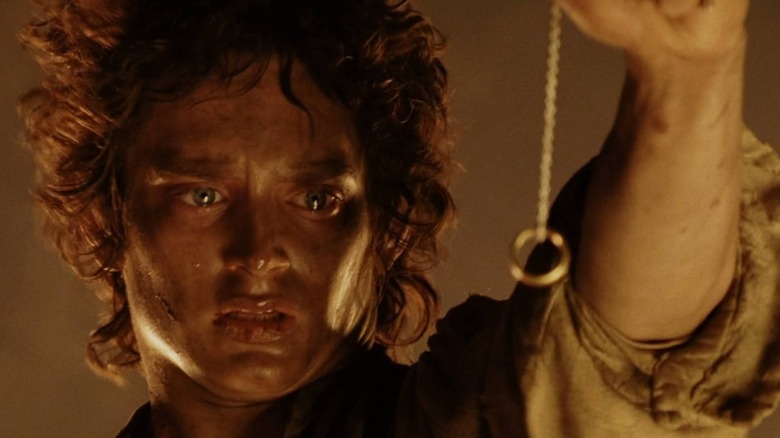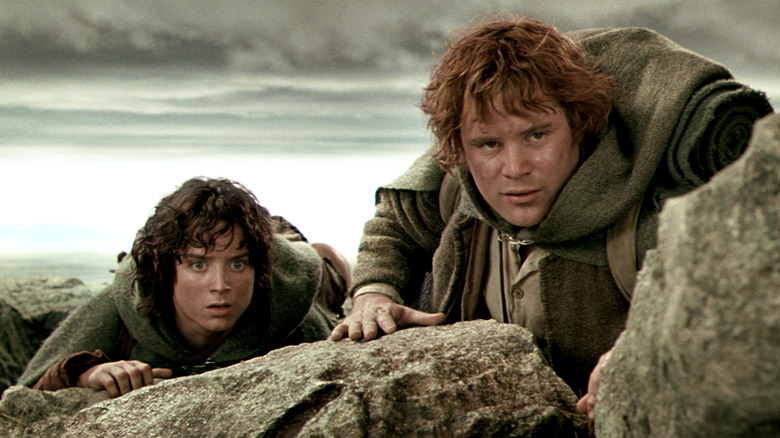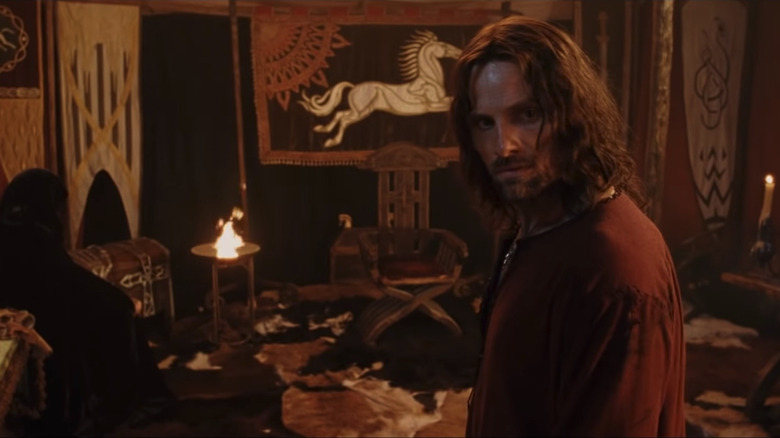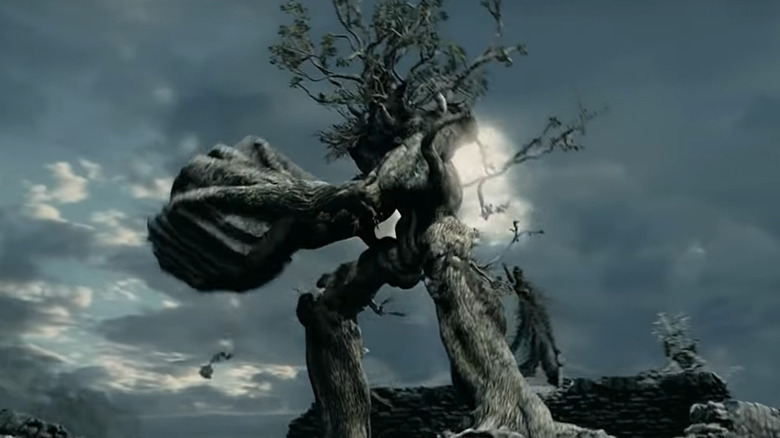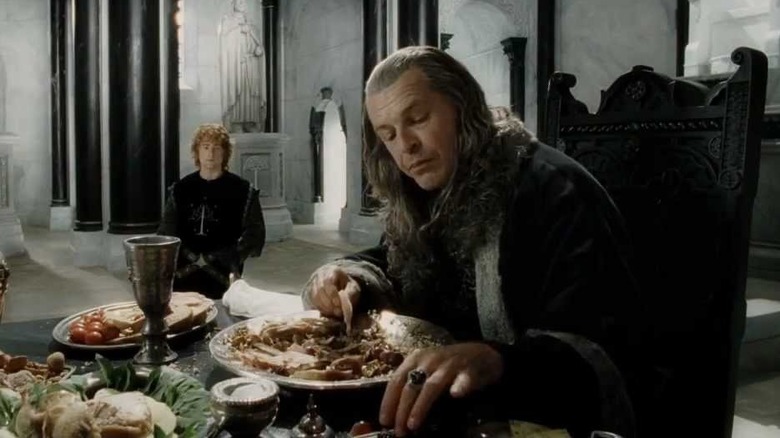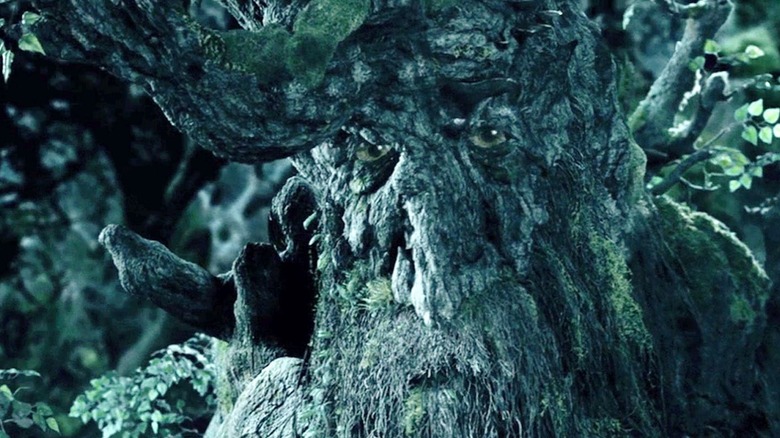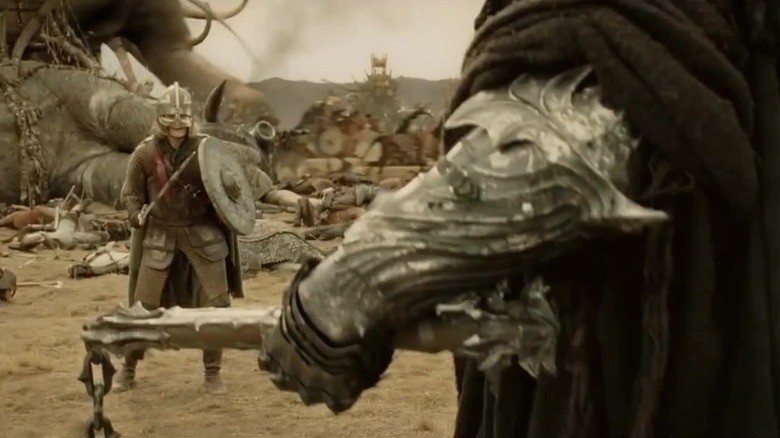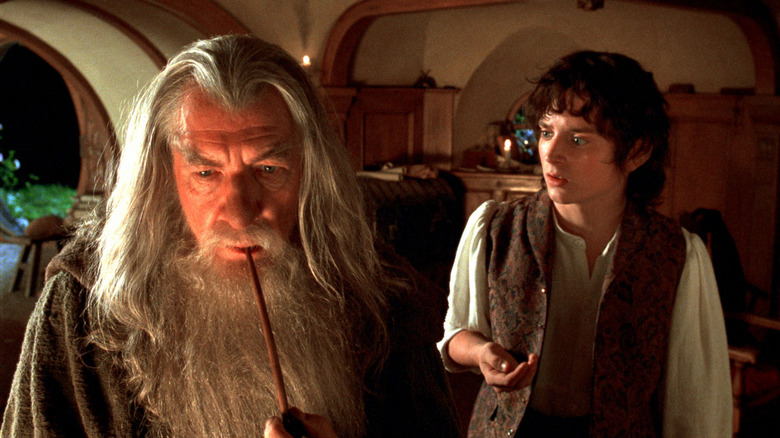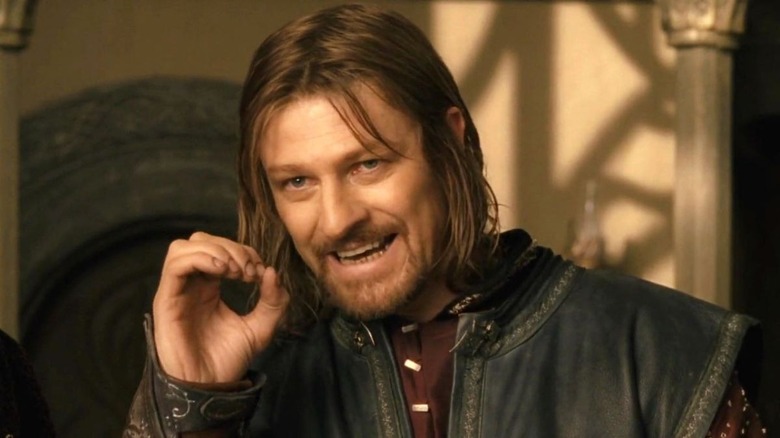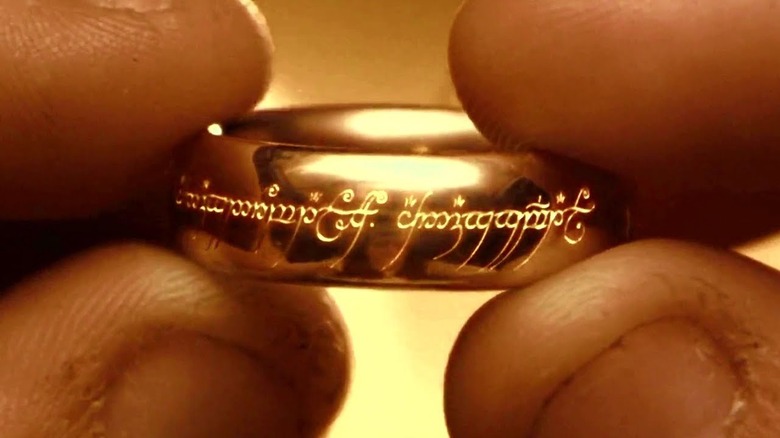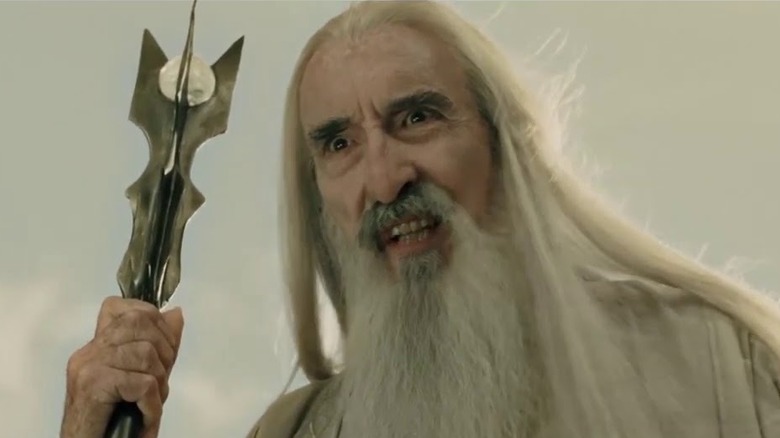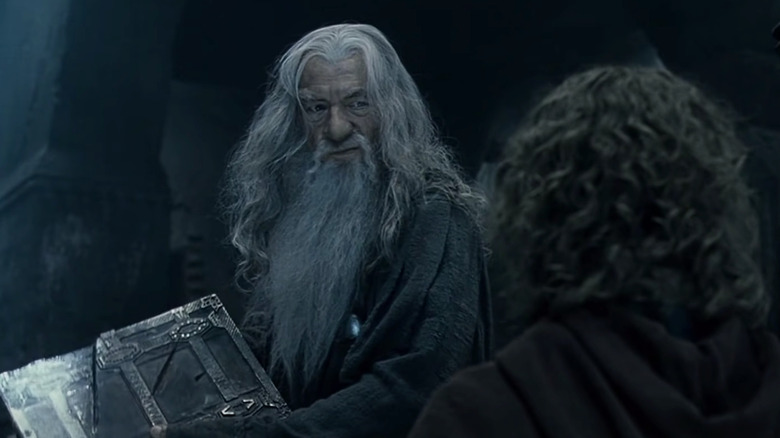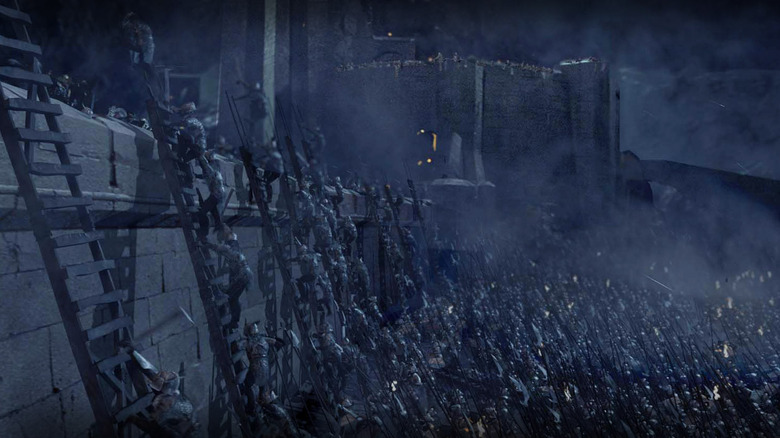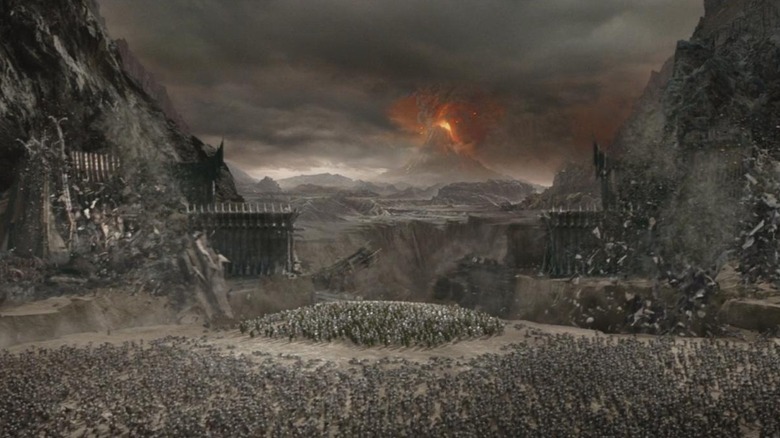The Worst Decisions Lord Of The Rings Characters Made In The Franchise
One of the last things that Gandalf says in "The Hobbit" is, "You don't really suppose, do you, that all your adventures and escapes were managed by mere luck, just for your sole benefit?" These themes of deeper fate and destiny are woven throughout J.R.R. Tolkien's writings.
But even though there's structure and purpose in Tolkien's works, that doesn't mean everyone makes wise decisions. In "The Lord of the Rings" story that follow those closing lines of "The Hobbit," we can find an abundance of poor choices. Many of these bad decisions show up in Peter Jackson's Academy Award-winning adaptation of the trilogy. In fact, the director and his intrepid crew even went right ahead and wrote several new boneheaded moves by different characters right into their scripted version of the story.
We've gone through and highlighted some of the most obvious examples of poor judgment made by the characters in Jackson's films. There are both obvious candidates and subtle mistakes. So, without further ado and in no particular order, let's roll out our list of some of the absolute worst decisions "The Lord of the Rings" characters made throughout the franchise's three-film story arc.
Gandalf goes to see Saruman
Gandalf is one of the Istari, the five wizards who play a unique and instrumental role in Middle-earth history. This group is secretly sent to help the free peoples of the world resist the growing might of Sauron. The existence of their covert mission is top-secret information, which is why it makes sense that they need to visit one another from time to time to make sure they're all on the same page.
Even so, when Gandalf decides to visit Saruman, who's technically considered the head of their order at that point, it turns out to be one of the worst decisions of his entire wizarding career. In "The Fellowship of the Ring," Gandalf announces to Frodo that Saruman will know what to do. This seems reassuring, and the wizard takes off from there, headed to Isengard to talk with his peer.
But after Gandalf arrives at Orthanc, he's lured into a trap. When he refuses to join Saruman in his evil ways, the Grey Pilgrim is imprisoned on top of Orthanc. He misses his rendezvous with Frodo, and the Black Riders almost ruin all of his plans but don't quite (thank you, Aragorn!). While there's no way Gandalf could've known about Saruman's treachery, it doesn't change the fact that his quick trip to get some advice from his co-worker ends up being a disastrously bad decision.
Frodo trusts Gollum
Okay, okay. We know that Gollum is a fascinating character with just as many supporters as detractors. And yes, if Frodo didn't take him under his wing, the Ring never would've been destroyed. We get it, we get it. But we're talking about bad decisions here, and there are plenty of negative aspects to bring up when it comes to the trust the Ringbearer puts in his precious companion.
The biggest issue is the whole Shelob situation. Even when Sméagol appears to have turned a corner, Gollum eventually wins out, and the nasty creature leads his semi-trusting companions directly into the lair of Her Ladyship. In "Return of the King," Frodo is quite willing to follow the faux-redeemed Gollum — admittedly out of a sense of mercy and hope for the wretched creature — but the decision nearly leads to Frodo's death and the failure of the quest.
Now, it's worth pointing out the fact that Frodo incorporating Gollum into his journey on some level makes sense. After all, the villain is tracking them, and the smart move is to capture him and keep an eye on him. The desire to have mercy on and pity for Gollum is also understandable. But we're talking about trust here. Even though it does have its limits, Frodo's trust in Gollum, especially in the movie version, is clearly too comfortable, and it leads him right into some eight-legged trouble.
Frodo sends Sam away
By the end of the movies, we know for a fact that Gollum is a treacherous fella. Sure, he's conflicted and enslaved by the power of the One Ring, but pity aside, he still just keeps on making one bad decision after another. Unfortunately, Frodo doesn't see this issue until it's far too late ...and Sam ends up paying the price for it.
When Frodo, Sam, and Gollum reach the Morgul Vale and start climbing up the Stairs of Cirith Ungol, Gollum frames Sam for eating too much food. When Sam counter-accuses Gollum of setting the whole thing up, things come to a head ...and Frodo chooses Gollum over Sam. Yeah, the entire situation is pretty pathetic — and a complete swing and a miss for the Ring-bearer. Earlier in the story, Frodo tries to send Sam home because he doesn't want to lead his faithful gardener and friend to death in Mordor. But the idea of sending Samwise Gamgee, the Samwise Gamgee, away because he's causing trouble? It's just too much.
On top of being a poor choice because, well, it's just short-sighted and mean, the act of ousting Sam ends up being one of Frodo's worst decisions in his long, agonizing journey. Gollum leads him straight to Shelob, and when the spider strikes, Sam isn't by his side to help.
Aragorn trusts Elrond
Aragorn and Elrond's stories are closely entwined. The former is a very distant descendant of Elrond's twin brother, Elros (they're like 60 generations removed but still). Aragorn grows up under the protection of Elrond too. And, of course, he ends up marrying the lord of Rivendell's daughter.
In spite of the reasons to have some built-up trust, the future king and the leader of Rivendell end up having a pretty tense relationship for a while there. Elrond has Andúril, an ancient sword that is Aragorn's by right, and Elrond doesn't give it to Aragorn until much later in the story. Sure, Aragorn isn't begging for it or anything, but why the delayed timeline?
Plus, Elrond is clearly unhappy at the fact that Arwen wants to marry a mortal man and doesn't want to leave Middle-earth. His feelings are so strong that, when Aragorn heads out with the Fellowship of the Ring, Elrond even tries to lure Arwen into leaving for the Undying Lands rather than staying in Middle-earth and choosing a mortal life.
From love interests to his ancestral claims, Aragorn doesn't end up having much of a reason to trust Elrond. And yet, he ends up with his shiny new sword, his reclaimed kingdom, and Arwen as his queen — so, at least the Ranger's trust in his future father-in-law doesn't do too much long-term damage.
Saruman provokes Fangorn
In "The Two Towers" book, Saruman literally refers to the Ents as wild wood-demons, which — cool nickname alert. But the comment also gives away the fact that Saruman clearly knows about the existence of his nearby arboreal neighbors. In fact, earlier in the book, Treebeard also tells Merry and Pippin that he "used to talk to him. There was a time when he was always walking about my woods. He was polite in those days, always asking my leave (at least when he met me); and always eager to listen."
So, Saruman knows about the Ents. Okay. Then why on earth does he go ahead and chop down a bunch of their trees? In the movie in particular, the old wizard seems completely flabbergasted that the Ents could retaliate beyond some creaking and swaying.
And yet it's his underestimation of the Ents that truly leads to his downfall. Think about it. If the Battle of Helm's Deep had ended up the same but the Ents never sided with the heroes, the forces of Rohan would've had to lay siege to Isengard ... with an active wizard still inside. They wouldn't have been able to send as many riders to Gondor, and they would have lost many more men taking down Saruman, if not for the angry tree-herders. In the end, the White Wizard's choice to proactively provoke the wrath of Fangorn Forest is one of his biggest mistakes.
Denethor tells his people to flee
When you sum his accomplishments up, Denethor is pretty pathetic. In fact, he's one of those "Lord of the Rings" characters that we ended up loathing by the end of the story. He aggressively antagonizes Faramir, ignores his duties, and leaves his city unprepared to defend itself. He's preoccupied with himself and doesn't even mind sending his own son on a mission sure to end in death.
This is all bad enough, but there's one point where Denethor makes a decision that's so stupid that it has to make this list: He tells his soldiers to run away from the battle.
When the Witch-king's massive army shows up on the doorstep of Minas Tirith, Denethor completely goes off the rails. He panics and tells his soldiers to flee for their lives. He even says that they should abandon their posts. This is ludicrous advise, especially from the top dog in a fortress of war, and it leads to the steward of Gondor being smacked in the face by Gandalf's staff. Nice job, Denethor. Nice.
The Ents decide not to attack Isengard
One of the key events in "The Two Towers" takes place when the Ents attack Isengard. This decision is supposed to be made during an Entmoot where a bunch of Ents gather together and discuss what they should do about the threat of Saruman. But when the meeting ends, Merry and Pippin learn that their treeish friends have decided that they can't bring themselves to go to war. They're going to sit out on the sidelines instead.
This unfortunate decision to tuck tail and run is a terrible idea since their home is in real danger. It's only the timely intervention of the hobbits that convinces Treebeard to drop them off near Isengard. This shows him the destruction that Saruman has wrought, and he recalls the Ents, who decide — on the fly — to attack Isengard anyway.
The initial choice to stay out of the conflict is one of the worst decisions in the entire trilogy. The Ents are a strong people who can wreak incredible amounts of damage when aroused. The fact that they end up getting involved in the fighting is one of the key elements that ensures the good guys ultimately win. That said, their first choice to avoid the fight makes us question their wisdom when it comes to self-preservation.
The Witch-king confronts Éowyn
This is one of the best parts of the entire "The Lord of the Rings" trilogy. Let's run over the epicness together, shall we? The struggling Éowyn watches her father-figure Théoden get manhandled by the Witch-king and his Fell-beast, and then she challenges the pair in a battlefield duel. The villain declares that no living man can kill him, only to discover that he's fighting a valiant shield-maiden.
Okay ... the Nazgûl goes in for the kill anyway. His mount is taken out, but he manages to nearly defeat Éowyn on foot, only to be stabbed by Merry's barrow blade at the last second. This causes him great pain, but the worst is yet to come. Éowyn totters up and drives her blade home between her enemy's crown and mantle, dispatching him in the process.
Raw, awesome heroics right there. If you're looking for a list of the worst decisions, you also can easily toss this one in too. The Witch-king is so high on his own stock that he charges right into fray without a second thought, only to find that his prophesied fate has finally caught up with him. He should have killed Théoden and left his minions to dispatch the Rohirric soldiers (and hidden shield-maiden) surrounding their king. Instead, he learns of his poor choice too late.
Gandalf leaves the One Ring in the Shire
Gandalf is a pretty smart guy. But that means when he does make mistakes, they tend to be really obvious. For example, he goes to visit Saruman, and that's clearly a bad idea, even if he doesn't know it at the time.
The other big blunder that nearly blows up in his face is the fact that he leaves the One Ring behind in the Shire. Remember, this isn't the point before he visits Frodo to confirm his suspicions. At this point, he knows he's dealing with the One Ring. Does he have a lot of other cares and concerns weighing on him? Sure. But come on. It's the One Ring for goodness sake. Don't you think you should, like, take Frodo to Rivendell with you right then? Or at least assign a Ranger to secretly watch Bag End or something?
Of course, Gandalf doesn't know about the Black Riders when he leaves. When he finds out about them in the tower of Orthanc, it's too late. He's trapped, as the smug face of Saruman informs him. Gandalf's blunders are few and far between. And let's face it, the guy takes on a lot of high-profile responsibilities. But that does mean that whenever he makes a bad choice, things can go really, really wrong.
Boromir goes to the Council of Elrond
One of the most subtle bad decisions to make this list takes place outside of the scope of the story itself. In the lead-up to "The Lord of the Rings," Boromir and Faramir have a disturbing dream that tells them to seek for the sword that was broken in Imladris — the elvish name for Rivendell. To be more specific, Faramir has this dream many times ...and Boromir has it once. Yeah. Just once. But he's the elder brother, and when he hears the prophetic words, he decides that he needs to be the one who answers the call.
When we meet Boromir, he's already taken on the quest to answer the dream. In fact, he's traveled all the way to Rivendell (only to join the Fellowship of the Ring, turn right around, and head all the way back toward home). Later on in the movies, we discover that Boromir is also sent to the council with a personal agenda from his father, Denethor.
The headstrong older brother reaches Rivendell safely and plays an important part in the rest of the story. However, in the end, he gives into the lure of the Ring and even tries to take it by force. If Boromir had just stepped aside and, oh, maybe just let his admittedly awesome little bro take on the quest, maybe things would have gone much differently. At the least, Frodo wouldn't have been traumatized when he decided to branch off from the company and head toward Mordor with just Sam.
Sauron puts too much stock in the One Ring
This one is a little tricky to break down in detail in a few paragraphs. The story of Sauron and the One Ring starts way back in the Second Age. This narrative, which is in "The Silmarillion" and other Middle-earth books, reveals that there is definitely a solid motivation behind why Sauron makes these overpowered pieces of jewelry in the first place.
It may be a tad simplistic, but ultimately, Sauron makes the One Ring because he wants to dominate the wills of those wearing the other Rings of Power. You can see the success of this conquest strategy in the way that it completely corrupts the Nazgûl and enslaves them to his will.
That said, when you look at how things go after Sauron forges the One Ring, it's kind of hard not to say creating the supercharged trinket was a bit of a mistake. First, it gives Isildur a direct target to aim for when he cuts the Ring off with his father's broken sword. Second, it lays out the blueprint for the Dark Lord's final destruction. No matter what way you slice it, making the One Ring was a bad move for the overly ambitious Dark Lord.
Saruman takes on Gandalf after being defeated
Saruman misjudges a lot of things in his bid for total power. He misreads the potential threat of the Ents. He tries and fails to undermine Théoden's authority. He invades Rohan just a tad too late and is defeated. But of all of his poor decisions, this one has to be the worst: He underestimates Gandalf ... after he's lost.
When Gandalf arrives in a post-Ent-slapped and flooded Isengard in the extended edition of "The Return of the King," he rides up to the tower of Orthanc and has a less-than-pleasant conversation with its grumpy magic-wielding occupant. Saruman attempts to work the scene by deflecting conversations and using his voice to influence Gandalf's companions, but ultimately, his willingness to engage with Gandalf the White epically blows up in his face.
Eventually, a testy Saruman tries to shoot a fireball at Gandalf, which doesn't do much. Gandalf — who, let's remember, is now the superpowered Gandalf the White — reveals his superiority by taking over the situation, forcing his opponent to stay and listen to him, and casting him out of the Order of the Wizards and the White Council. The disgraced Saruman's staff is broken, and a few minutes later, the whole scene leads directly to his death. Talk about a conversation not going your way. Don't engage. Don't engage!
Pippin makes a racket in Moria
Throughout the "Lord of the Rings" series, Pippin establishes himself a reputation as a rapscallion. This troublemaking tendency is particularly visible in "The Fellowship of the Ring," and it gets the Took and his friends into some serious trouble when they're traveling through Moria. As the group investigates Balin's tomb, Pippin notices a skeletal figure sitting on the edge of a well. He touches the remains, sending them crashing into the deeps and waking up the entire subterranean world in the process.
The hobbit's lack of discretion has bad decision-making written all over it. Pippin's Tookish curiosity alerts the dwellers in the deep to the presence of the Fellowship and directly brings a vast hosts of goblins, a troll, and the Balrog flocking to the Chamber of Mazarbul to disturb Balin's rest.
This leads to a sharp fight where Frodo only avoids death thanks to his hidden Mithril coat. The resulting chase ends with Gandalf's duel with the Balrog too. It's a lot of fallout from Pippin's single mistake and one that the hobbit clearly at least kind of takes to heart afterward.
Théoden goes to Helm's Deep
In "The Two Towers," Théoden is saved from a possessed stupor induced by Saruman and stoked by Wormtongue. When Gandalf arrives in Edoras, though, he breaks the enchantment and frees the king to ride out and resist the evil wizard ... only for Théoden to end up heading straight to Helm's Deep, where there are just a few hundred old men and boys ready to fight when he gets there. Sure, a group of veteran elvish warriors shows up randomly from Lothlorien, but that still isn't enough to stem the tide against Saruman's army.
Théoden's decision to go to Helm's Deep just feels like a bad idea from the get-go. Remember, this happens after he's sent Éomer off with a bunch of his best soldiers. With practically no one left to fight for him, he goes and traps his people — who, let's remember, love riding into battle on horseback — in an instantly impossible situation
From there, the king spends the next few hours regretting the decision, and he ultimately comes riding out to what he thinks will be a glorious death. He's only saved by a last-minute dual eucatastrophe in the form of the returned Éomer and his army, as well as the Huorns and Ents from Fangorn. Next time, listen to your counselors, dude. And for goodness sake, keep Éomer by your side, please.
Sauron lets the attack on his front door distract him
As if forging the One Ring and then losing it wasn't bad enough, Sauron goes and makes one of his biggest blunders right before he's finally defeated once and for all. This takes place when Aragorn and company march a dinky little army up to the Black Gate of Mordor in an attempt to distract the Dark Lord.
The villain takes the bait in jaws of steel. He lays his traps well and then surrounds the returned king and his army. Then, just when Sauron feels certain that he's about to destroy his enemies, he realizes that the whole thing was a giant distraction and that Frodo has succeeded in destroying the Ring (via Gollum).
The blunder of overlooking the defense of his own land can't be overstated. Sauron completely misses the fact that the One Ring is literally in his own realm. Instead, he focuses on the approaching attack, only to suffer the most complete defeat possible shortly afterward. It's a fitting ending for a baddie defined by the need to control and micromanage everything.
